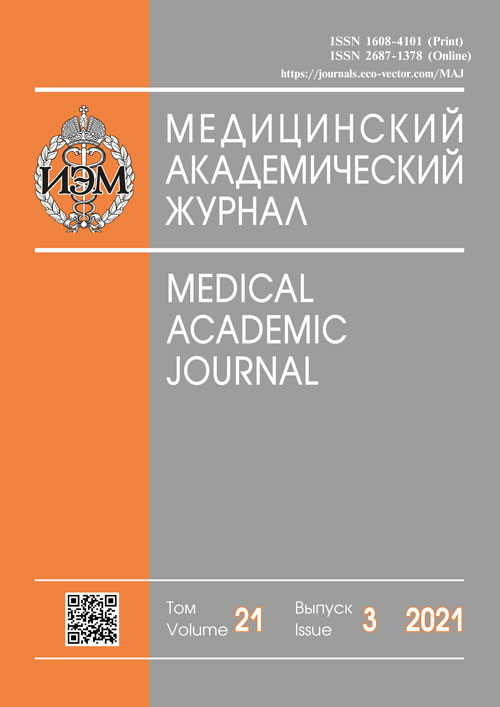Получение холодоадаптированных штаммов вируса гриппа A с модифицированным геном NS методом генной инженерии и оценка их свойств
- Авторы: Чистякова А.К.1, Прокопенко П.И.2, Крутикова Е.В.2, Степанова Е.А.2, Исакова-Сивак И.Н.2, Руденко Л.Г.2
-
Учреждения:
- Санкт-Петербургский политехнический университет Петра Великого
- Институт экспериментальной медицины
- Выпуск: Том 21, № 3 (2021)
- Страницы: 153-158
- Раздел: Материалы конференции
- Статья опубликована: 06.12.2021
- URL: https://journals.eco-vector.com/MAJ/article/view/77563
- DOI: https://doi.org/10.17816/MAJ77563
- ID: 77563
Цитировать
Полный текст
Аннотация
Обоснование. Высокая изменчивость возбудителя вируса гриппа, появление новых вариантов вирусов приводят к необходимости постоянного обновления состава противогриппозных вакцин. Один из вариантов решения данной проблемы — разработка вакцин, направленных на усиление перекрестной защиты от широкого спектра штаммов гриппа. Генно-инженерные препараты на основе живой гриппозной вакцины могут быть использованы для направленной стимуляции клеточного звена иммунного ответа. Экспериментально доказано, что эпитопы цитотоксических T-лимфоцитов, встроенные в ген NS штамма живой гриппозной вакцины, вызывают активацию лимфоцитов и формирование пула резидентных Т-клеток памяти в легких у модельных животных. При выборе эпитопов для встраивания оптимально применять экспериментально подтвержденные иммуногенные участки.
Цель данной работы — получение экспериментальных штаммов вируса гриппа А на основе донора аттенуации А/Ленинград/134/17/57 с модифицированным геном NS, в который встроены иммуногенные эпитопы белка PB1, а также оценка свойств этих штаммов in vitro.
Материалы и методы. В ген, кодирующий белок NS1, встраивали кассету, содержащую иммуногенные, консервативные среди широкого спектра штаммов гриппа Т-клеточные эпитопы белка PB1 вируса гриппа, специфичные для распространенных вариантов HLA-подтипов. Модифицированный ген NS клонировали в вектор для обратной генетики вируса гриппа pCIPolISapIT. Жизнеспособный вирус гриппа получали путем трансфекции клеток Vero методом электропорации на основе стандартной 8-плазмидной системы. Ростовые характеристики вирусов оценивали в развивающихся куриных эмбрионах.
Результаты. Получены три штамма на основе донора аттенуации А/Ленинград/134/17/57 с модифицированным геном NS и современных вирусов гриппа подтипов H1N1, H3N2, H7N9. Таким образом, модификация NS путем вставки комбинации иммуногенных эпитопов PB1 не влияла на жизнеспособность полученных химерных вакцинных штаммов независимо от состава поверхностных белков. Данные штаммы могут эффективно размножаться в развивающихся куриных эмбрионах при оптимальной температуре, являются температурочувствительными и способны к репликации при сниженной температуре.
Заключение. Полученные штаммы можно считать перспективными кандидатами для дальнейшего изучения в качестве экспериментальной гриппозной вакцины, направленной на усиленную стимуляцию Т-клеточного иммунного ответа расширенного спектра действия.
Ключевые слова
Полный текст
Об авторах
Анна Константиновна Чистякова
Санкт-Петербургский политехнический университет Петра Великого
Автор, ответственный за переписку.
Email: anna.k.chistiakova@gmail.com
ORCID iD: 0000-0001-9541-5636
студент
Россия, Санкт-ПетербургПолина Игоревна Прокопенко
Институт экспериментальной медицины
Email: pi.prokopenko@gmail.com
аспирант
Россия, Санкт-ПетербургЕлена Витальевна Крутикова
Институт экспериментальной медицины
Email: krutikova.iem@gmal.com
ORCID iD: 0000-0002-0383-2625
SPIN-код: 6330-6128
канд. биол. наук, научный сотрудник отдела вирусологии им. А.А. Смородинцева
Россия, Санкт-ПетербургЕкатерина Алексеевна Степанова
Институт экспериментальной медицины
Email: fedorova.iem@gmail.com
ORCID iD: 0000-0002-8670-8645
SPIN-код: 8010-3047
канд. биол. наук, старший научный сотрудник отдела вирусологии им. А.А. Смородинцева
Россия, Санкт-ПетербургИрина Николаевна Исакова-Сивак
Институт экспериментальной медицины
Email: isakova.sivak@iemspb.ru
ORCID iD: 0000-0002-2801-1508
SPIN-код: 3469-3600
д-р биол. наук, заведующая лабораторией иммунологии и профилактики вирусных инфекций отдела вирусологии им. А.А. Смородинцева
Россия, Санкт-ПетербургЛариса Георгиевна Руденко
Институт экспериментальной медицины
Email: vaccine@mail.ru
ORCID iD: 0000-0002-0107-9959
SPIN-код: 4181-1372
д-р мед. наук, профессор, заслуженный деятель науки Российской Федерации, заведующая отделом вирусологии им. А.А. Смородинцева
Россия, Санкт-ПетербургСписок литературы
- Isakova-Sivak I., Matyushenko V., Stepanova E. et al. Recombinant live attenuated influenza vaccine viruses carrying conserved T cell epitopes of human adenoviruses induce functional cytotoxic T cell responses and protect mice against both infections // Vaccines (Basel). 2020. Vol. 8, No. 2. P. 196. doi: 10.3390/vaccines8020196
- Kotomina T., Korenkov D., Matyushenko V. et al. Live attenuated influenza vaccine viral vector induces functional cytotoxic T-cell immune response against foreign CD8+ T-cell epitopes inserted into NA and NS1 genes using the 2A self-cleavage site // Hum. Vaccin. Immunother. 2018. Vol. 14, No. 12. P. 2964–2970. doi: 10.1080/21645515.2018.1502529
- Matyushenko V., Kotomina T., Kudryavtsev I. et al. Conserved T-cell epitopes of respiratory syncytial virus (RSV) delivered by recombinant live attenuated influenza vaccine viruses efficiently induce RSV-specific lung-localized memory T cells and augment influenza-specific resident memory T-cell responses // Antiviral Res. 2020. Vol. 182. P. 104864. doi: 10.1016/j.antiviral.2020.104864
- Isakova-Sivak I., Chen L.M., Matsuoka Y. et al. Genetic bases of the temperature-sensitive phenotype of a master donor virus used in live attenuated influenza vaccines: A/Leningrad/134/17/57 (H2N2) // Virology. 2011. Vol. 412, No. 2. P. 297–305. doi: 10.1016/j.virol.2011.01.004
- Reed L.J., Muench H. A simple method of estimating fifty per cent endpoints // American Journal of Epidemiology. 1938. Vol. 27, No. 3. P. 493–497. doi: 10.1093/oxfordjournals.aje.a118408
- Киселева И.В., Климов А.И., Григорьева Е.П. и др. Генетический и фенотипический анализ гетерогенной популяции холодоадаптированного донора аттенуации A/Ленинград/134/17/К7/57 (H2N2) и реассортантных вакцинных штаммов, подготовленных на его основе // Вопросы вирусологии. 2005. Т. 50, № 2. С. 14–18.
- Koutsakos M., Illing P.T., Nguyen T.H.O. et al. Human CD8+ T cell cross-reactivity across influenza A, B and C viruses // Nat. Immunol. 2019. Vol. 20, No. 5. P. 613–625. doi: 10.1038/s41590-019-0320-6
Дополнительные файлы







